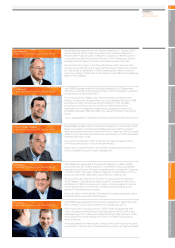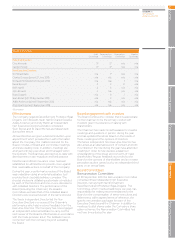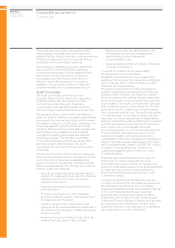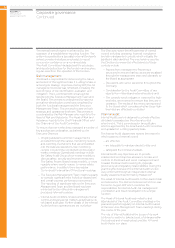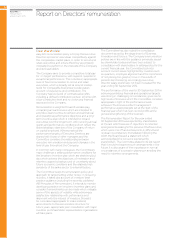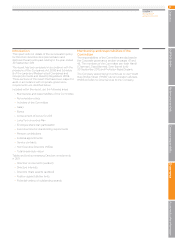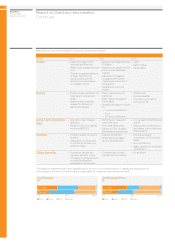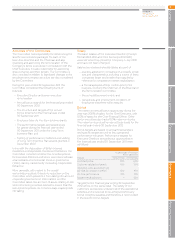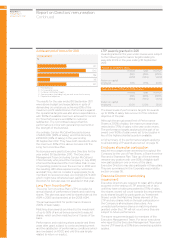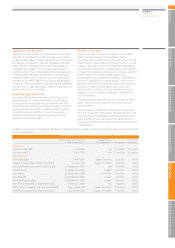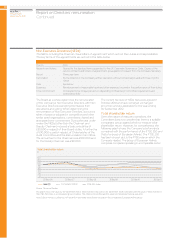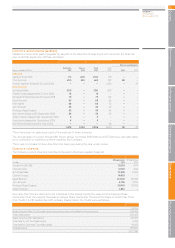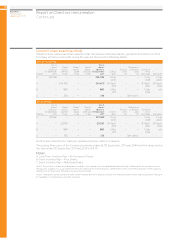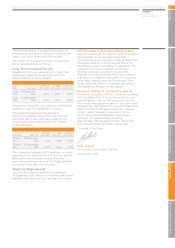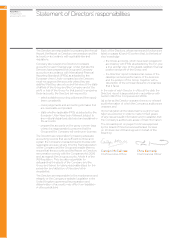EasyJet 2011 Annual Report Download - page 54
Download and view the complete annual report
Please find page 54 of the 2011 EasyJet annual report below. You can navigate through the pages in the report by either clicking on the pages listed below, or by using the keyword search tool below to find specific information within the annual report.
Report on Directors’ remuneration
Dear shareholder
easyJet’s remuneration policy is to pay the Executive
Directors and senior executives competitively against
the comparative market place, in order to recruit and
retain executives and ensure that they are properly
motivated to perform in the interests of the Company
and its shareholders.
The Company aims to provide competitive ‘total pay’
for ‘on target’ performance, with superior rewards for
exceptional performance. This includes an appropriate
level of fixed remuneration to recruit and retain
executives, which is broadly set at around median
levels for comparable businesses but also takes
account of experience and contribution. The
Company has low levels of contractual benefits,
including a defined contribution pension scheme with
a low contribution level and no continuing financial
exposure to the Company.
Remuneration is weighted towards variable pay,
comprising annual bonuses which are intended to
provide a clear incentive to achieve annual financial
and operational performance objectives and a long-
term incentive plan which is intended to reward
executives over the longer term, with recurring annual
grants and performance conditions which reflect the
stated strategic objective of the Company of return
on capital employed. Where practical the
performance targets of Executive Directors are
aligned with those of other managers and the
Committee considers the relationship between
executive remuneration and pay and changes in the
level of pay throughout the Company.
In common with many companies, the Committee’s
major challenge is setting performance conditions for
the long-term incentive plan which are stretching but
also which achieve the objectives of motivation and
retention, against a background of uncertainty about
future economic conditions and the relatively high
sensitivity of the airline sector to external factors.
The Committee keeps its remuneration policy and
approach to target setting under review. In reviewing
its policy, it takes due account of investors' best
practice guidance (including the recently published
ABI Principles of Remuneration). It intends to monitor
developing practice on long term incentive plans and
consider if amendments can be made which mitigate
some of the aspects of volatility while achieving a
satisfactory relationship with performance and
alignment with the interest of investors. Should it
be considered appropriate to make material
amendments to the remuneration structure for
future years, appropriate prior consultation with major
investors and shareholder representative organisations
will take place.
The Committee has also noted the consultation
document issued by the department of Business,
Innovation and Science. The Company’s remuneration
policies are in line with the guidance previously issued
by shareholder bodies and have been subject to
consultation with shareholders. In setting policy for the
current financial year, the Committee took into
account current issues highlighted by investors such
as quantum, employee alignment and the importance
of not placing too great a focus on the results of
periodic benchmarking. Accordingly, Executive
Director salary levels have not been increased for the
year ending 30 September 2012.
The performance of the year to 30 September 2011 in
achieving ambitious financial and operational targets
was strong in challenging circumstances, gives rise to
high levels of bonuses which the Committee considers
appropriate in light of the performance levels
achieved. The bonuses reflect management
performance against targets set at the start of the
financial year which has seen record profits and a
general strengthening of the business.
The Remuneration Report for the year ended
30 September 2010 was rejected by shareholders
at the last AGM because of objections to retention
arrangements relating to the previous Chief Executive,
which were one off and entered into in difficult and
unusual circumstances. Immediately following the
AGM, the Board issued a statement which
acknowledged the concerns expressed by
shareholders. The Committee stated in its last report
that it would not approve such arrangements in the
future. It is also aware of the importance in normal
circumstances of succession planning in avoiding the
need for retention arrangements.
52
easyJet plc
Annual report
and accounts 2011



